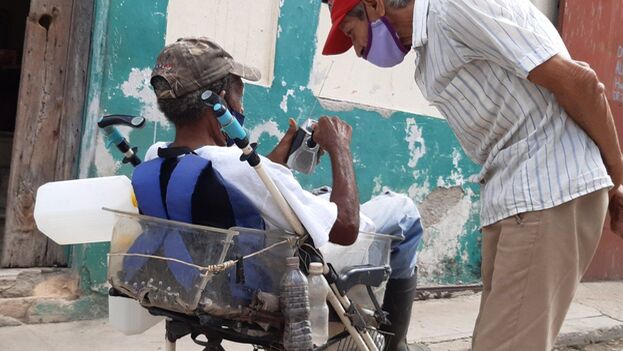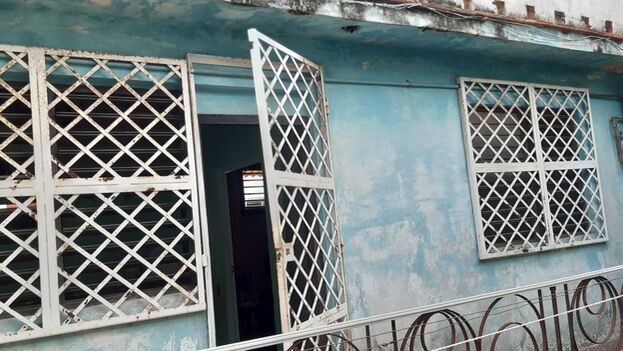
![]() 14ymedio, Natalia López Moya, Havana, 2 November 2021 — “Sometimes I want to give up, every day it is more difficult to survive in this situation.” Paco is 72 and has invested 43 of them in working, but his pension of 1,700 pesos is just over half of the 3,000 pesos that the basic food basket has reached in Cuba with the implementation of the ’Ordering Task’* in January of this year.
14ymedio, Natalia López Moya, Havana, 2 November 2021 — “Sometimes I want to give up, every day it is more difficult to survive in this situation.” Paco is 72 and has invested 43 of them in working, but his pension of 1,700 pesos is just over half of the 3,000 pesos that the basic food basket has reached in Cuba with the implementation of the ’Ordering Task’* in January of this year.
The reform czar, Marino Murillo, admitted last week that inflation had skyrocketed and the basket had risen to approximately double what was expected, 1,528 pesos. The average salary of a worker is around 5,000 pesos and it is already difficult to do more than survive, but for retirees, like Paco, the problem is suffocating.
“What bothers me the most about all this is that they know that we do not have enough money from the pension to survive, but they do nothing to fix it,” denounces Paco, a resident of the Cerro municipality in the Cuban capital, who insists on using this fictitious name so as not to be identified by people close to the Government.
Food is Paco’s first problem, but by no means the last or the most serious. His house has considerable damage due to lack of maintenance and he cannot even think about renovations, when he barely has enough to eat or buy medicine. “In my good old days I used to do over the house, plaster, paint … But now it’s impossible, because everything is too expensive or in freely convertible currency stores, where I can’t buy. The only thing I can do is pick up the rubble when a piece of plaster falls from the ceiling,” he laments.

Gas, water and electricity bills also play havoc with Paco’s checkbook, as he tries to save on those utilities as much as he can so he will pay less. “It’s not just the monthly bills. Recently the building’s motor broke down and I had to call my son to take care of paying the 300 pesos they collected per apartment. Then my stove broke, and I bought a small and repaired one, which they gave me in installments. The grace cost me almost three months of suffering, because I stopped buying food to be able to pay that,” he explains.
Now he is worried about something apparently minor, but sad for the life of the retiree. Paco acquired his Panda brand television with the stimulus he earned at his last job. Although he recently finished paying for it, the device is about to be useless. “When it breaks I definitely don’t know what I’m going to do, but there is also the mess of digital television. The Government thinks that I can spend 1,200 pesos to buy the famous box – he says in reference to the digital decoder – but I prefer to eat versus watching TV.”
Another front opened in Paco’s difficult domestic economy is clothing. Both this and his footwear have exploded in such a way that it is impossible for him to renew his clothing. His worn out and unique shoes and a hole in the sweater he is wearing attest to that. “It is inconceivable that I don’t have anything to wear either. Many times I have had to turn to relatives to leave me some old clothes or shoes. I feel totally helpless by the Government, and also afraid of complaining, because we already know well how they treat those who disagree.”
But at his age, perhaps the most worrying thing is the lack of access to medicine. In the midst of the pandemic, he had to stop taking some drugs that were simply lacking, and he has had to endure pain caused by two nodules in his liver because there are no pills. “When I can’t take any more, I go to the doctor to get injections, but sometimes not even that, because the lack of drugs has also happened in hospitals.”
Fortunately, he has had the help of some neighbors who shared some painkillers with him, although there have been those who tried to charge him a fortune taking advantage of the shortage. “My soul breaks when a vendor shows up and offers me a a little bottle with 50 ibuprofen in 1,000 pesos, I don’t know where we’re going to stop.”

Paco is one of many retirees who suffer the same problems every day, even some of those with social benefits. Luckily, he has the support of his children, but things are not easy for the youngest. “My children help me as much as they can, although they also have it difficult, and that’s how I’m making do, a little from here, a little from there,” explains Paco.
In this last year, and at the risk of catching the coronavirus, he has had to line up to resell the odd product, with the money earned, he goes to the agricultural market to buy some food, vegetables or seasoning. “Before I did not stand in line nor die, now I have no choice.”
Paco regrets that retirement is harder than he thought and has considered doing some work to supplement it, such as collecting raw materials, acting as a courier or cutting the lawn of a garden, but he admits that he is no longer healthy for that and feels dependent on a few pesos that his nephew sends him “from the revolted and brutal capitalism that those here criticize so much.”
When asked if he still trusts the Cuban system, Paco is clear: “If what we are experiencing is the socialism promised by Fidel in the 1960s, I don’t want it. I don’t even know what will happen to me next month. I only think about how I will survive in my near future and I will leave this world one day with a thorn stuck in my heart, because I regret a thousand times not having been able to leave here when I had the chance.”
*Translator’s note: Tarea ordenamiento = the [so-called] ‘Ordering Task’ which is a collection of measures that includes eliminating the Cuban Convertible Peso (CUC), leaving the Cuban peso as the only national currency, raising prices, raising salaries (but not as much as prices), opening stores that take payment only in hard currency which must be in the form of specially issued pre-paid debit cards, and others.
____________
COLLABORATE WITH OUR WORK: The 14ymedio team is committed to practicing serious journalism that reflects Cuba’s reality in all its depth. Thank you for joining us on this long journey. We invite you to continue supporting us by becoming a member of 14ymedio now. Together we can continue transforming journalism in Cuba.
